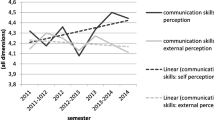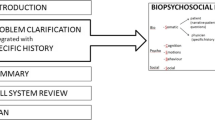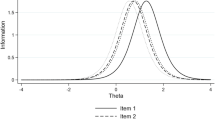Abstract
Communication skills training is an accepted part of undergraduate medical programs nowadays. In addition to learning experiences its importance should be emphasised by performance-based assessment. As detailed checklists have been shown to be not well suited for the assessment of communication skills for different reasons, this study aimed to validate a global rating scale. A Canadian instrument was translated to German and adapted to assess students’ communication skills during an end-of-semester-OSCE. Subjects were second and third year medical students at the reformed track of the Charité-Universitaetsmedizin Berlin. Different groups of raters were trained to assess students’ communication skills using the global rating scale. Validity testing included concurrent validity and construct validity: Judgements of different groups of raters were compared to expert ratings as a defined gold standard. Furthermore, the amount of agreement between scores obtained with this global rating scale and a different instrument for assessing communication skills was determined. Results show that communication skills can be validly assessed by trained non-expert raters as well as standardised patients using this instrument.
Similar content being viewed by others
Notes
Item 11: “Clarifies patient’s statements.” Item 22: “If reads, writes doesn’t interfere with dialogue/rapport.”
References
Aspegren, K. (1999). BEME Guide No.2: Teaching and learning communication skills in medicine—a review with quality grading of articles. Medical Teacher, 21(6), 563–570.
Boon, H., & Stewart, M. (1998). Patient–physician communication assessment instruments: 1986 to 1996 in review. Patient Education and Counseling, 35, 161–176.
Burger, W., & Froemmel, C. (2002). Der Berliner Reformstudiengang Medizin, Zielsetzung und erste Erfahrungen. Bundesgesundheitsblatt, 45, 152–158.
Cate ten, T. J., & De Haes, J. C. J. M. (2000). Summative assessment of medical students in the affective domain. Medical Teacher, 22, 40–43.
Cohen, D. S., Colliver, J. A., Marcy, M. S., Fried, E. D., & Swartz, M. H. (1996). Psychometric properties of a standardised-patient checklist and rating-scale form used to assess interpersonal and communication skills. Academic Medicine, 71, S87–S89.
Cunnington, J. P. W., Neville, A. J., & Norman, G. R. (1997). The risks of thoroughness: Reliability and validity of global ratings and checklists in an OSCE. In A. J. J. A. Scherpbier, C. P. M. van der Vleuten, J. J. Rethans & A. F. W. van der Steeg (Eds.), Advances in medical education (pp. 143–145). Dordrecht: Kluwer Academic Publishers.
Cushing, A. (2002). Assessment of non-cognitive factors. In G.R Norman, C. P. M. van der Vleuten, & D. I. Newble (Eds.), International handbook of research in medical education, (pp. 711–755). Dordrecht: Kluwer Academic Publishers.
Duffy, F. D., Geoffrey, H. G., Whelan, G., Cole-Kelly, K., & Frankel, R. (2004). Assessing competence in communication and interpersonal skills: The Kalamazoo II Report. Academic Medicine, 79, 495–507.
Heine, N., Garman, K., Wallace, P., Bartos, R., & Richards, A. (2003). An analysis of standardised patient checklist errors and their effect on student scores. Medical Education, 37, 99–104.
Hodges, B., & McIlroy, J. H. (2003). Analytic global OSCE ratings are sensitive to level of training. Medical Education, 37, 1012–1016.
Hodges, B., Regehr, G., McNaughton, N., Tiberius, R., & Hanson, M. (1999). OSCE checklists do not capture increasing levels of expertise. Academic Medicine, 74, 1129–1134.
Humphris, G. M., & Kaney, S. (2001). The Liverpool brief assessment for communication skills in the making of doctors. Advances in Health Sciences Education, 6, 69–80.
Kurtz, S., Silverman, J., & Draper, J. (1998). Teaching and learning communication skills in medicine. Abingdon, Oxon, UK: Radcliffe Medical Press Ltd.
Lang, F., McCord, R., Harvill, L., & Anderson, D. S. (2004). Communication assessment using the common ground instrument: Psychometric properties. Family Medicine; 36, 189–198.
Mazor, K. M., Ockene, J. K., Rogers, H. J., Carlin, M. M., & Quirk, M. E. (2005). The relationship between checklist scores on a communication OSCE and analogue patients’ perceptions of communication. Advances in Health Sciences Education, 10, 37–51.
Miller, S. J., Hope, T., & Talbot, D. C. (1999). The development of a structured rating schedule (the BAS) to assess skills in breaking bad news. British Journal of Cancer, 80, 792–800.
Newble, D. (2004). Techniques for measuring clinical competence: Objective structured clinical examination. Medical Education, 38, 199–203.
Regehr, G., MacRae, H., Reznick, R., & Szalay, D. (1998). Comparing the psychometric properties of checklists and global rating scales for assessing performance on an OSCE-format examination. Academic Medicine, 79, 993–997.
Simpson, M., Buckman, R., Stewart, M., Maguire, P., Lipkin, M., & Novack, D. (1991). Doctor–patient communication: the Toronto consensus statement. British Medical Journal, 303, 1385–1387.
Spencer, J. A., & Silverman, J. (2004). Communication education and assessment: Taking account of diversity. Medical Education, 38, 116–118.
Swartz, M. D., Colliver, J. A., Bardes, C. L., Charon, R., Fried, E. D., & Moroff, S. (1999). Global ratings of videotaped performance versus global ratings of actions recorded on checklists: A criterion for performance assessment with standardised patients. Academic Medicine, 74, 1028–1032.
Van Dalen, J., Prince, C. J. A. H., Scherpbier, A. J. J. A., & Van der Vleuten, C. P. M. (1998). Evaluating communication skills. Advances in Health Sciences Education, 3, 187–195.
Van der Vleuten, C. P. M., Dolmans, D. H. J. M., & Scherpbier, A. J. J. A. (2000). The need for evidence in education. Medical Teacher, 22, 246–250.
Van der Vleuten, C. P. M., Norman, G. R., & De Graaf, E. (1991). Pitfalls in the pursuit of objectivity: Issues of reliability. Medical Education, 25, 110–118.
Yedidia, M., Gillespie, C. C., Kachur, E., Schwartz, M. D., & Ockene, J. et al. (2003). Effect of communication training on medical student performance. JAMA, 290, 1157–1165.
Acknowledgements
The authors would like to thank Waltraud Georg, Sebastian Schubert, Walter Burger and Brian Hodges for their support and professional advice; OSCE examiners, communication skills experts and standardised patients for their participation and critical remarks; the students of the Reformed Medical Track for their participation.
This study was funded by the Bund-Laender-Kommission für Bildungsplanung und Forschungsfoerderung, the Robert Bosch Stiftung and the VolkswagenStiftung.
Author information
Authors and Affiliations
Corresponding author
Rights and permissions
About this article
Cite this article
Scheffer, S., Muehlinghaus, I., Froehmel, A. et al. Assessing students’ communication skills: validation of a global rating. Adv in Health Sci Educ 13, 583–592 (2008). https://doi.org/10.1007/s10459-007-9074-2
Received:
Accepted:
Published:
Issue Date:
DOI: https://doi.org/10.1007/s10459-007-9074-2




